
PSYCHOMETRIKA
Scope & Guideline
Fostering innovative research in psychometrics since 1936.
Introduction
Aims and Scopes
- Psychometric Theory Development:
Focuses on advancing the theoretical underpinnings of psychometric models, including item response theory, structural equation modeling, and diagnostic classification models. - Measurement and Assessment Innovations:
Explores innovative methodologies for assessment in educational and psychological contexts, emphasizing the development of reliable and valid measurement tools. - Statistical Methods in Psychometrics:
Investigates sophisticated statistical techniques applicable to psychometric research, including Bayesian methods, multilevel modeling, and machine learning approaches. - Cognitive and Behavioral Measurement:
Examines the measurement of cognitive and behavioral constructs, emphasizing the integration of process data and response time analysis in psychometric evaluations. - Applications in Educational Assessment:
Focuses on the application of psychometric principles in educational settings, particularly in the context of large-scale assessments and individualized testing.
Trending and Emerging
- Bayesian Methods and Computational Psychometrics:
Bayesian approaches are increasingly prevalent, showcasing their utility in psychometric modeling and inference, particularly in the context of complex and high-dimensional data. - Dynamic and Adaptive Assessment Models:
There is a growing trend towards developing models that adapt to individual response patterns over time, enhancing the precision of assessments and the understanding of cognitive processes. - Integration of Process Data:
The incorporation of process data, such as response times and eye-tracking metrics, is gaining attention as a means to enrich psychometric evaluations and provide insights into cognitive processes. - Network Psychometrics:
Emerging interest in network psychometrics highlights the relationships and dependencies among psychological constructs, offering new perspectives on how psychological phenomena are interrelated. - Multidimensional Item Response Theory:
There is an increasing focus on multidimensional IRT models that can capture the complexity of psychological constructs and provide a more comprehensive understanding of individual differences.
Declining or Waning
- Traditional Reliability Analyses:
There has been a noticeable reduction in studies solely focused on classical reliability measures such as Cronbach's alpha, as the field shifts towards more nuanced approaches to measurement reliability. - Basic Item Analysis Techniques:
Basic techniques for item analysis, such as simple distractor analysis and item-total correlations, are being overshadowed by more complex psychometric models that offer deeper insights into item functioning. - Static Models in Psychometric Research:
The use of static models that do not account for dynamic changes in measurement over time is becoming less common, as there is a growing emphasis on longitudinal and adaptive assessment models. - Single-Dimensional Item Response Theory:
Research focusing exclusively on single-dimensional IRT models is declining, with a shift towards multidimensional and complex models that better capture the intricacies of psychological constructs.
Similar Journals

International Journal of Assessment Tools in Education
Fostering Discourse to Elevate Assessment StandardsInternational Journal of Assessment Tools in Education is a pioneering scholarly publication dedicated to advancing the field of educational assessment through innovative tools and methodologies. Published by IZZET KARA and based out of the esteemed Pamukkale University in Turkey, this journal is committed to fostering academic discourse among researchers, educators, and policy makers. With an ISSN of 2148-7456, it aims to bridge the gap between assessment theory and practical application, ensuring that the latest insights in educational measurement can be readily accessed by professionals in the field. The journal promotes open access to its articles, enhancing visibility and facilitating the dissemination of knowledge. By publishing rigorous empirical studies, theoretical discussions, and practical reports, it plays an essential role in shaping best practices in educational assessment, making it an invaluable resource for anyone invested in improving educational outcomes.
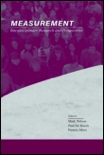
Measurement-Interdisciplinary Research and Perspectives
Exploring Interdisciplinary Frontiers in MeasurementMeasurement-Interdisciplinary Research and Perspectives (ISSN: 1536-6367, E-ISSN: 1536-6359), published by Routledge Journals, Taylor & Francis Ltd, serves as a pivotal platform for the dissemination of innovative research across the disciplines of applied mathematics, education, and statistics. With an impressive convergence of research since its establishment in 2010, this journal not only displays a commendable impact factor but also maintains a Q3 ranking in three critical categories for 2023, highlighting its influence within the academic community. Located in the United Kingdom, the journal is dedicated to fostering interdisciplinary approaches that enhance measurement practices and contribute to educational advancements. Despite its current status not being open access, it remains accessible through various academic databases, making it a valuable resource for researchers, professionals, and students alike who seek to engage with cutting-edge methodologies and findings in measurement sciences.

SIAM Journal on Financial Mathematics
Advancing Knowledge at the Intersection of Math and FinanceThe SIAM Journal on Financial Mathematics, published by SIAM PUBLICATIONS, is a premier journal dedicated to the intersection of applied mathematics and finance. With an ISSN of 1945-497X, this journal serves as a vital platform for the dissemination of innovative research that addresses complex financial problems through mathematical modeling and analytical techniques. The journal has established itself within the Q2 quartile in the categories of Applied Mathematics, Finance, and Numerical Analysis, reflecting its influence and significance in these fields. Researchers and practitioners will find a wealth of knowledge spanning topics from stochastic calculus to quantitative finance, making it essential for anyone aiming to advance their understanding of financial mathematics. As the journal continues to converge from 2010 to 2024, it promises to remain a cornerstone resource for academics, professionals, and students alike, facilitating the ongoing dialogue between mathematics and its applications in the financial industry.
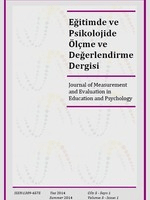
Journal of Measurement and Evaluation in Education and Psychology-EPOD
Exploring New Frontiers in Educational and Psychological Evaluation.Journal of Measurement and Evaluation in Education and Psychology-EPOD is a distinguished open-access journal published by the ASSOCIATION FOR MEASUREMENT & EVALUATION IN EDUCATION & PSYCHOLOGY since 2010, based in Ankara, Turkey. Focusing on the critical intersections of education and psychology, this journal aims to disseminate valuable research that enhances assessments and evaluation methodologies across diverse educational settings. With a commitment to advancing knowledge, it explores a broad range of topics pertaining to developmental and educational psychology, making it an essential resource for researchers, professionals, and students alike. Despite its recent challenges, highlighted by its Q4 categorization in both Developmental and Educational Psychology and Education, the journal continues to provide a platform for innovative ideas and discussions crucial to shaping future educational practices. Access the latest findings and contribute to the field through this vital scholarly outlet.
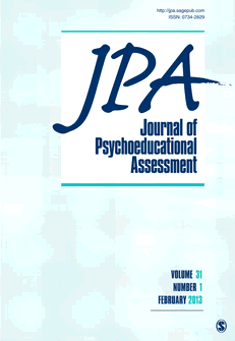
JOURNAL OF PSYCHOEDUCATIONAL ASSESSMENT
Advancing psychoeducational insights for transformative practices.The JOURNAL OF PSYCHOEDUCATIONAL ASSESSMENT, published by SAGE PUBLICATIONS INC, serves as a leading platform for disseminating high-quality research in the fields of clinical psychology and education. With its ISSN 0734-2829 and E-ISSN 1557-5144, this distinguished journal has been at the forefront of advancing knowledge since its inception in 1983, and it continues to publish innovative studies aimed at enhancing psychoeducational assessment practices. Recognized in the 2023 category quartiles as Q2 in Clinical Psychology, Education, and miscellaneous Psychology, the journal holds significant rankings in Scopus, with Education at rank #479, Clinical Psychology at #126, and General Psychology at #100, reflecting its substantial impact in the social sciences. Although it does not offer Open Access, the valuable insights provided in its articles contribute meaningfully to the ongoing discourse among researchers, professionals, and students alike. The JOURNAL OF PSYCHOEDUCATIONAL ASSESSMENT is an essential resource for those seeking to enhance their understanding of psychoeducational methods and assessments, ultimately aiming to improve educational outcomes and clinical practices.
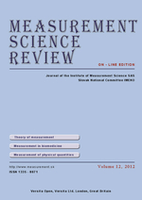
Measurement Science Review
Connecting Ideas in Biomedical and Engineering MeasurementsMeasurement Science Review is a distinguished open-access journal published by SCIENDO, dedicated to advancing the field of measurement science across various disciplines, including Biomedical Engineering, Control and Systems Engineering, and Instrumentation. Since its inception in 2008, it has actively contributed to the dissemination of innovative research and practices relevant to these fields, currently holding a notable Q3 ranking in its category as per the 2023 metrics. With an emphasis on robust scientific inquiry and practical applications, Measurement Science Review is positioned as an essential resource for researchers, professionals, and students seeking to enhance their understanding and expertise in measurement technologies. The journal provides an accessible platform for interdisciplinary dialogue and collaboration, making it a vital component of the academic landscape in Slovakia and beyond. Its publication track extends to 2024, ensuring timely access to cutting-edge research findings for a global audience.
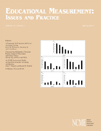
Educational Measurement-Issues and Practice
Elevating Educational Assessment Standards.Educational Measurement-Issues and Practice, published by WILEY, stands as a premier journal in the field of education, recognized for its commitment to advancing understanding of measurement issues and methodologies in educational contexts. Established in 1982, this journal spans over four decades of scholarly contributions, maintaining a remarkable Q1 status within the Education category as per the 2023 metrics, and ranking #407 out of 1543 in Scopus's Education domain, placing it in the top 73rd percentile. It features a range of articles that address critical issues concerning educational assessment practices, policy implications, and innovative measurement methodologies, aimed at professionals, researchers, and students dedicated to enhancing educational assessment frameworks. With its ongoing focus on contemporary challenges and developments in the field, Educational Measurement-Issues and Practice plays a crucial role in shaping effective educational policies and practices worldwide, making it an essential resource for anyone involved in educational research and measurement.

TPM-Testing Psychometrics Methodology in Applied Psychology
Exploring Innovative Methodologies in Psychological TestingTPM-Testing Psychometrics Methodology in Applied Psychology is a distinguished journal published by CENTRO INFORMAZIONE SCIENTIFICA ECONOMICA SOCIALE-CISES SRL in Italy, focusing on the vital intersection of psychometrics and applied psychology. With an ISSN of 1972-6325, this journal has been an essential resource since its inception in 2005, providing an academic platform for researchers, professionals, and students dedicated to advancing the field. The journal currently holds a Q3 ranking in both Applied Psychology and Psychology (miscellaneous) within the prestigious Scopus database, highlighting its commitment to scholarly excellence and relevance. Although it is not an open-access journal, TPM is a valuable source for rigorous methodologies and innovative applications in psychological testing and assessment. As the field continues to evolve, TPM seeks to address contemporary challenges and promote interdisciplinary collaboration, making it a crucial contributor to the landscape of applied psychology research and practice.
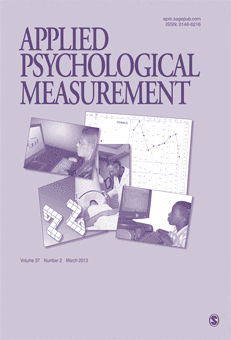
APPLIED PSYCHOLOGICAL MEASUREMENT
Empowering Research Through Rigorous AssessmentApplied Psychological Measurement is a leading journal in the field of psychology and social sciences, published by SAGE Publications Inc. since its inception in 1977. With an impressive 2023 impact factor and consistently ranking in the Q1 quartile for both Psychology and Social Sciences categories, this journal plays a pivotal role in disseminating high-quality research that advances the understanding of psychological assessment and measurement methodologies. The journal embraces a diverse array of research contributions, ranging from empirical studies to theoretical discussions, covering critical topics that affect practitioners and researchers alike. With its comprehensive scope and rigorous peer-review process, Applied Psychological Measurement serves as an essential resource for researchers, professionals, and students aiming to deepen their knowledge and application of psychological measurement within various social contexts. The journal is based in the United States, ensuring a prominent platform for international discourse.
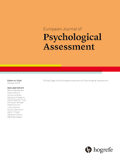
EUROPEAN JOURNAL OF PSYCHOLOGICAL ASSESSMENT
Innovating Assessment Techniques for Tomorrow's PsychologyWelcome to the European Journal of Psychological Assessment, a prestigious publication in the field of applied psychology, published by Hogrefe Publishing Corp. With a strong emphasis on advancing the methods and practices of psychological assessment, this journal has established itself as a crucial resource for researchers, practitioners, and students alike. Since its inception in 1996, it has built a reputation for quality and innovation, reflected by its impressive Q1 ranking in the applied psychology category, signifying its critical role in shaping the future of the discipline. The journal's impactful contributions – ranked #62 out of 249 within its field and indexed in Scopus at the 75th percentile – make it an essential reading for anyone interested in the latest assessment techniques and research findings. Although not an open-access journal, it continues to reach audiences through institutional subscriptions and provides a wealth of knowledge aimed at enhancing psychological practice and research.